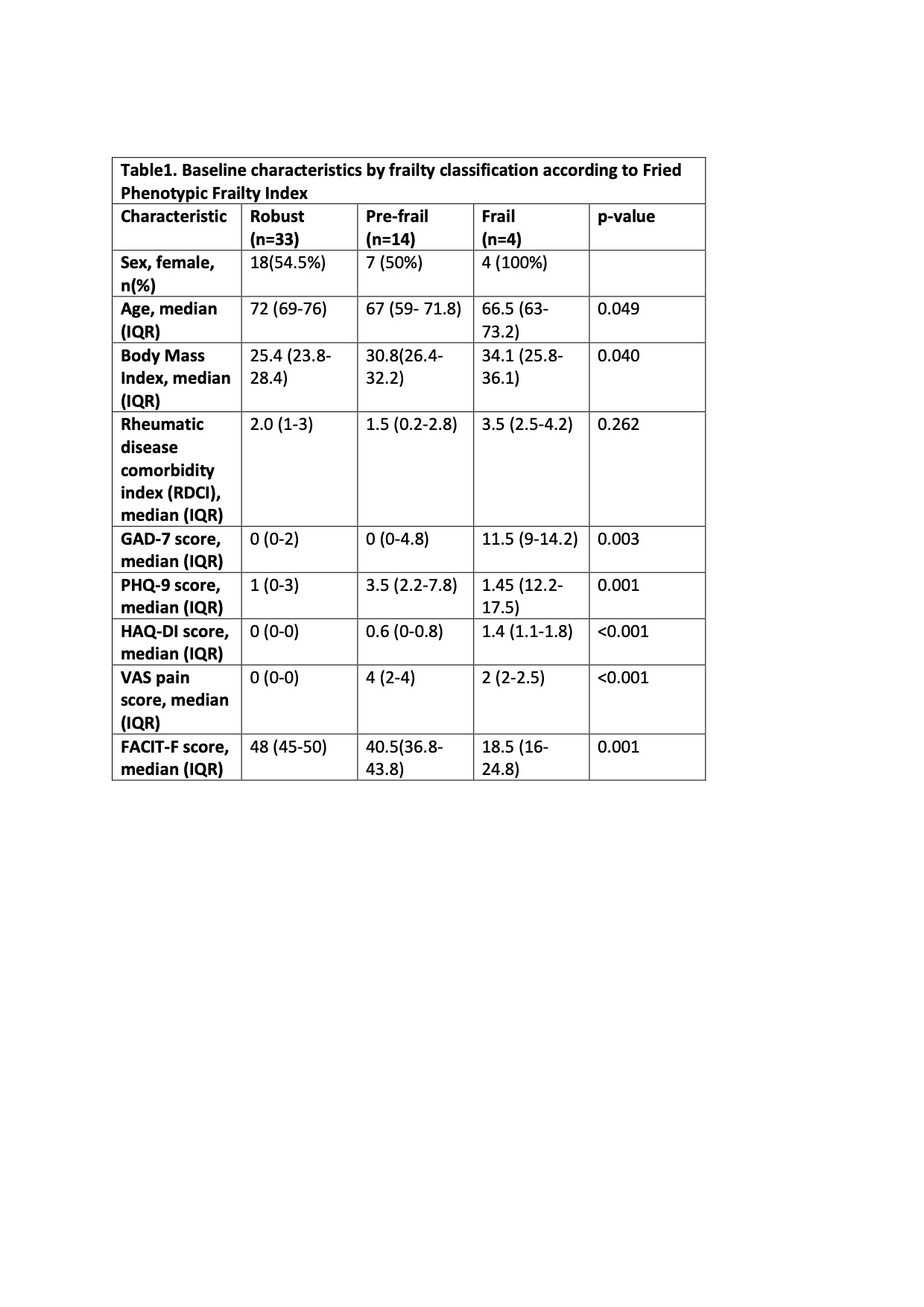Session Information
Date: Monday, November 13, 2023
Title: (1200–1220) Patient Outcomes, Preferences, & Attitudes Poster II
Session Type: Poster Session B
Session Time: 9:00AM-11:00AM
Background/Purpose: Frailty is an increasingly important construct in the field of rheumatology, aiding the identification of individuals with increased vulnerability to accelerated clinical decline and overall worse disease outcomes.
The aim of this research was to explore the prevalence of frailty, and its potential associated impact on patient reported outcomes (PRO’s) in a cohort of patients with Polymyalgia Rheumatica (PMR).
Methods: Patients with a diagnosis of PMR (fulfilling the 2012 EULAR/ACR Classification Criteria), who were in clinical remission and on active treatment with glucocorticoids were recruited from two centres. Patients were ≥3 months and ≤12 months from diagnosis.
Frailty was defined by the 5 criteria of the widely validated Fried Phenotypic Frailty Index.
Patient reported outcomes included anxiety, using the Generalised Anxiety Disorder Assessment (GAD-7), mood, using the Patient Health Questionnaire (PHQ-9), fatigue using the Functional Assessment of Chronic Illness Therapy – Fatigue Scale (FACIT-F), pain, using the Visual Analogue Scale (VAS) and overall health related quality of life, using the Health Assessment Questionnaire-Disability Index (HAQ-DI). The associations between categorical variables were compared using chi-squared or Fishers exact test where appropriate. The association between continuous variables and categorical variables were assessed using the Kruskal-Wallis test. Correlations were calculated using Pearson’s r. All analyses were conducted using R (R Core Team, 2022). A p-value of < 0.05 was considered as statistically significant.
Results: 51 consecutive patients were recruited, of which 56.9% (n=29) were female. Using the Fried Phenotypic index, 64.7% (n=33) were classified as robust, 27.5% (n=14) as pre-frail, and 7.8% (n=4) as frail. All patients classified as frail were female, and had a statistically significant higher BMI (p=0.040) than those in the robust and pre-frail categories. Compared to robust individuals, those who were frail had statistically significant higher median GAD-7 (p=0.003), PHQ-9 (p=0.001), VAS (p=< 0.001) and HAQ-DI (p< 0.001) scores. FACIT-F scores were also worse in those who were frail versus robust (p=0.001).
Conclusion: Over one third of patients with PMR in this cohort were classified as pre-frail or frail. Increased frailty status was significantly correlated with worse PRO’s, including mood, pain, fatigue and overall quality of life. As frailty is a potentially reversible state, accurately identifying frailty, and implementing appropriate interventions is of utmost importance to ensure improved clinical outcomes in those with PMR.
To cite this abstract in AMA style:
Harkins P, Cowley S, Kane D, Conway R. Frailty and Its Impact on Patient Reported Outcomes in Polymyalgia Rheumatica [abstract]. Arthritis Rheumatol. 2023; 75 (suppl 9). https://acrabstracts.org/abstract/frailty-and-its-impact-on-patient-reported-outcomes-in-polymyalgia-rheumatica/. Accessed .« Back to ACR Convergence 2023
ACR Meeting Abstracts - https://acrabstracts.org/abstract/frailty-and-its-impact-on-patient-reported-outcomes-in-polymyalgia-rheumatica/

